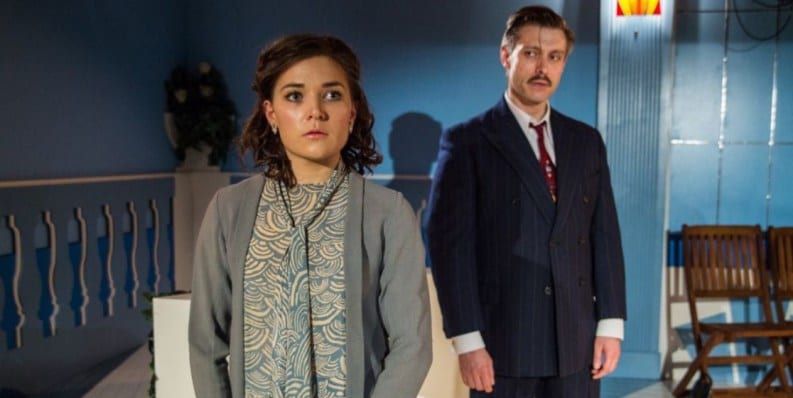Escaping an icy February evening into the warm, gloomy pub below the White Bear Theatre, one is distinctly unprepared for the vision of summer and excess waiting upstairs in writer and director Mark Giesser’s The Lady with a Dog, adapted from Anton Chekhov’s short story.
The set is awash with crystal blue and marble white and the art deco notes of Brighton Pier. The backdrop, however, turns out to be a popular Scottish beach resort – surely a contradiction in terms? The idyllic scene is accented by an ambitiously bright, beating sun. Perhaps the American director is yet to experience the pleasure of a Scottish summer himself.
The play unfolds in the years following the First World War with the acquaintance of Anne (Beth Burrows), a recently married, straight-laced young woman accompanied by her excitable Pomeranian, and Damian (Alan Turkington), an older married man and practiced philanderer. They find themselves falling in love, as Damian’s adulterous lust and Anne’s prudish manner are immersed in a genuine romance.
The first act is interspersed with imaginary conversations held by Anne and Damian with their respective partners. Elaine (Laura Glover) is a no-nonsense, exacting house wife, well-aware of her husband’s infidelities. Carl (Duncan Macinnes) is a soppy, sexless prospective Tory MP with an eye-infection that he calls his “war-wound”. Both serve as the conscience of their spouse, providing a platform for the central thrust of the play – the dynamic between traditional values and new ideas of personal liberty. Although revealing, these glaring episodes of introspection lack subtlety and are less prevalent during the far stronger second act.
Giesser’s adaptation departs significantly from the Chekhov and at times its literary foundation seems more burden than inspiration, particularly in the form of the spectral canine who inexplicably haunts the play. Anne’s dog floats in and out of perspective and, one assumes, would have been omitted entirely had the title not demanded its presence. Some reluctant mime work from the two leads occasionally reminds the audience that the invisible pet remains part of the action. Somehow, a real Pomeranian would be less annoying than this phantom menace.
The second act brings the play to life as Elaine and Carl take up more important roles within the narrative. Damian and Anne are forced apart when their holiday comes to an end, both returning to their imperfect family lives. Unable to be without his lover, Damian tracks her down, finding Anne and Carl at a cinema.
The ensuing scene is a feat of dynamic, fast-paced comedy, as Damian brazenly helps Carl with a crossword, making thinly veiled comments about the affair to the outrage of Anne. Giesser’s writing flourishes under these conditions, while the staging seems liberated by the inclusion of another hand to the lovers’ tryst. Duncan Macinnes is a brilliant comic actor and his portrayal of the oblivious but gentle Carl is filled with humour and pathos. He gratefully accepts Damian’s help with the crossword and sings his praises when he has departed, much to Anne’s shame.
The emotional force Giesser so urgently pursues in the first act only emerges when he gives up the chase in the second. It is fitting that a play reimagined for a British context finds its success through the tradition of British comedy, with humour inspiring the most poignant moments. Carl reveals at the close his knowledge of Anne’s infidelity, dropping the mask of comic innocence. He wants her to be happy and refuses to end the affair for her sake. The play asks the question “what happens when love and commitment get in each other’s way?” The answer seems to be: we laugh about it.

3
Reviewer's Rating
